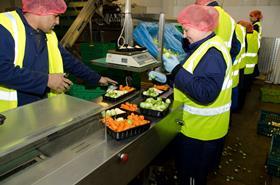
When David Frost, HR director at Produce World, joined the company back in 2008, the typical approach to try to boost workplace morale would involve redecorating the canteen or buying a new flat-screen TV.
It wasn’t working. Worker engagement, measured via an annual questionnaire, which asked workers to agree or disagree with the statement ‘this is a great place to work’, was hovering stubbornly around 47 per cent.
Frost knew the approach had to change. Everyone from the factory floor up had to feel involved in making the business a success. “There is a lot of evidence to support the idea that the higher the level of engagement, the higher the performance of the business,” he says.
Teaching managers the soft skills of how to effectively communicate with staff was a key part of this, he says. “We spent a lot of time working on improved communication,” he says. “There are now regular face-to-face team briefings for everyone on site, and our CEO William Burgess writes a letter to everyone on site every month. He is very open about how the business is performing, what the challenges are, and how our customers are performing.”
The company set up a leadership academy to train its managers. “It involved training 50 middle managers and supervisors across the organisation and they attended workshops every few weeks over two years to learn how to lead more effectively, coach, communicate and so on and the culmination of that was a graduation ceremony we had a few months back and that was one of the cornerstones of the strategy.”
The real turning point for the business came about a year ago when the company introduced proper formal one-to-ones with every single employee, from graders through to managers. “We go into detail about how engaged they are feeling and where we can make improvements, and that is something we feel has made a huge difference.”
Now, not only has the level of worker engagement, measured via the questionnaire, risen to 64 per cent but, according to Frost, there have been real, measurable improvements in business terms.
“At our roots business, a modification was made to the way in which the production line flows after the team realised that by relaying part of the line it saved £20,000 a year, so that is the sort of thing we are seeing,”
says Frost.
“In Butterwick we are introducing our IT system and more than ever we have had people enthusiastically embracing the change, so people have been going out to other sites to see how it is done, so we’ve seen a lot more collaborative work and that is very different to what we’ve had in the past.”
Frost says the business is now aiming for around 80 per cent worker engagement – a target that has been reached at some of its factory sites. “For a business like ours where you have a majority of people on a relatively low wage, it is multi-cultural, multi-language, we’ve got 80 per cent positive engagement on some of our sites which is absolutely outstanding.”
High worker engagement is crucial in implementing some of the other changes made by Produce World over the past few years in improving environmental sustainability, by monitoring energy and water use per hour and setting limits on water usage, plus making easy savings such as ensuring fridges are always closed.
Frost says his approach to HR is that it belongs right at the heart of a business. “In many ways my role is more strategy director and I think that is really what HR is, it is about leading strategy. Any key talent we need to bring in, I will work with our CEO to do that. Over the past two or three years we have restructured a lot of our management team and I have been at the heart of that, bringing a new chairman to the board.”
When it comes to new recruits, Frost acknowledges today’s graduates, Generation Y, have high expectations from potential employers. “I think expectations around career progression are now greater,” says Frost. “The expectation is that after a year or two or three I am going to go to the next stage, so it is important to give graduates the opportunity to move around. Today they want to work across categories – they might have done brassicas for a couple of years then they want to work on potatoes so they build up a breadth
of experience.”
Frost, who came to Produce World from Carlsberg UK, says he believes his approach is still fairly unusual in the fresh produce category, which he says is still quite utilitarian. “People come to work to get a job done and it is quite dirty and wet and cold. There hasn’t been a general view that you can apply what you can apply to the branded sector.” —



